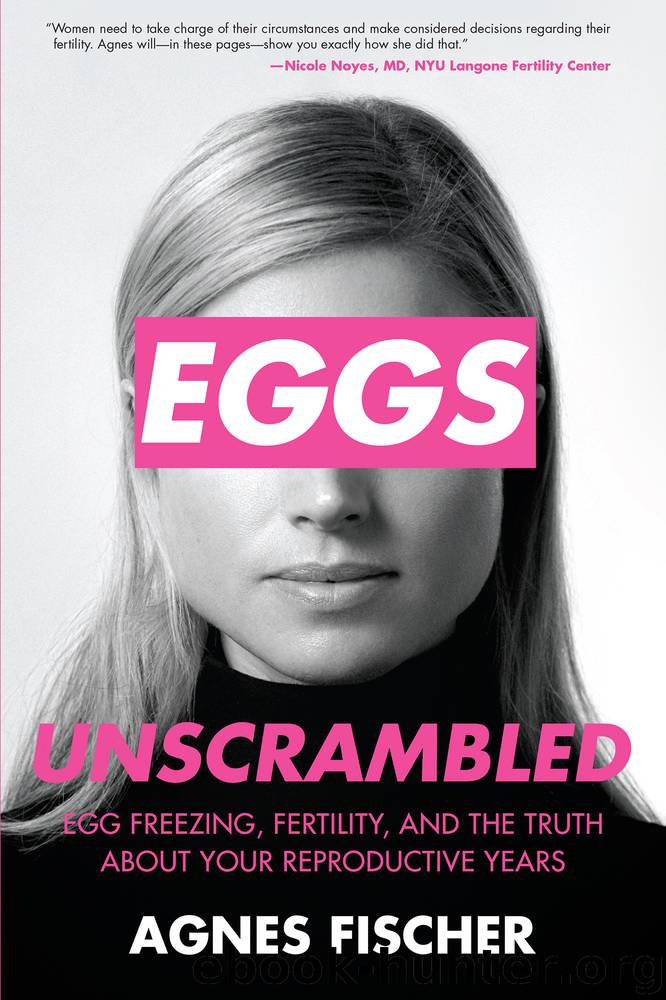Eggs Unscrambled by Agnes Fischer

Author:Agnes Fischer
Language: eng
Format: epub
Publisher: Regan Arts.
4. The younger, the better.
Okay, now that I have gotten all that cynicism out of my system—sorry, not sorry—let’s get back to just how astonishing it is that egg freezing is even a thing. Even if I never have a baby with one of my dear little hatchlings, the fact you can literally freeze your fertility in time still blows my mind. The general consensus amongst fertility doctors and embryologists is that egg freezing has made it so that eggs can be frozen indefinitely without damage (unless they are damaged during the thawing process). There is no expiration date! These eggs simply do not go bad.
But here is the thing: they need to be good in the first place. As we learned earlier, the success rate of eggs frozen before a woman is thirty-four is significantly higher than that of eggs frozen after that age. (“Success” being defined here as the ability to create a healthy baby.) That fact has real implications on any pregnancies that occur as a result of these frozen eggs. If you freeze your eggs at, say, age thirty-two, then implant an embryo made with those eggs at, say, forty years old, you will not need to undergo all the genetic tests that most women older than thirty-five do when they become pregnant naturally. (Good thing that, in this day and age, most forty-year-old women are in great shape. At thirty-eight, I feel better and healthier and more well balanced than I ever was in my late twenties or early thirties, because I have the means to take better care of myself).
So we have established that freezing younger is freezing smarter, right? Well, brace yourself for a catch-22. At the moment, most gynecologists actually make it a practice to discourage twenty-something women from freezing their eggs, because, they often say, these young women still have so many years to meet someone and have a baby naturally—so why undergo an expensive medical procedure that, like all medical procedures, carries a certain level of risk?
Kate has a (typically) wise theory about why gynecologists are hesitant to bring the procedure up in conversation. “Because for so long the technology of egg freezing was considered pioneering,” she says, “a large chunk of the medical profession viewed it as a false promise. The tech wasn’t good enough to make this procedure a real insurance policy, and the doctors feared that their patients would make life choices based on the wrong assumption. A lot of mainstream fertility doctors were saying, in its early days, ‘Let’s not talk about that.’ The dialogue was like, ‘Why freeze your eggs? Just go get pregnant now.’ ” For some doctors, that is still the best advice.
But while it still offers no guarantees, that faulty tech is now, of course, not so faulty. Still, while doctors, are of course, trained to consider risk versus benefit, sometimes they fail to discuss egg freezing for an even more objectionable reason. If you are, in their eyes, too young to be
Download
This site does not store any files on its server. We only index and link to content provided by other sites. Please contact the content providers to delete copyright contents if any and email us, we'll remove relevant links or contents immediately.
Name Book, The: Over 10,000 Names--Their Meanings, Origins, and Spiritual Significance by Astoria Dorothy(2982)
Tone Your Tummy Type by Denise Austin(2836)
The Ultimate Guide to Anal Sex for Women by Tristan Taormino(2296)
The Expectant Father by Armin A. Brott & Jennifer Ash(2269)
The Coregasm Workout by Debby Herbenick(2267)
The Women's Health Fitness Fix by Jen Ator(2240)
Expecting Better by Emily Oster(2209)
She-ology by Sherry A. Ross MD(2159)
The Hite Report on Shere Hite by Shere Hite(2061)
Woman: An Intimate Geography by Natalie Angier(1938)
8 Steps to Reverse Your PCOS by Fiona McCulloch(1910)
Birth by Tina Cassidy(1901)
The Female Brain by M.D. Louann Brizendine(1898)
101 Get-Lean Workouts and Strategies by Muscle & Fitness(1855)
Women & the Weight Loss Tamasha by Diwekar Rujuta(1798)
50 Ways to Soothe Yourself Without Food by Susan Albers(1787)
The Big Booty Blueprint: Your Guide To A Bigger Butt In Less Than 12 Weeks by Bella Rahbek & Brandon Carter(1670)
The overachievers by Robbins Alexandra(1576)
Unleash the Power of the Female Brain: Supercharging Yours for Better Health, Energy, Mood, Focus, and Sex by Daniel G. Amen M.D(1572)
